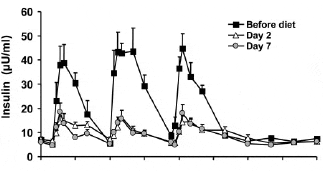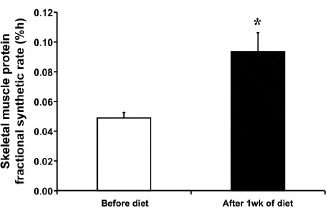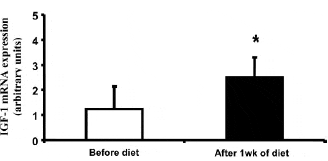berk
Member
- Joined
- Dec 28, 2019
- Messages
- 320
If you go over from a standard Western diet to a low-carb protein diet your muscles grow. Sports scientists at the University of Michigan discovered this when they did an experiment with 8 young men and women. And interestingly, the subjects did no weight training.
Insulin, textbooks continue to tell us, is an important anabolic hormone. Because your insulin level rises if you eat carbohydrates – the insulin level reacts less to glucose fed intravenously – scientists believed until recently that a low-carb diet reduces muscle mass. Empirical evidence and studies by anthropologists and archaeologists, however, indicate that the reverse is true.
That's why these researchers decided to do an experiment in which 4 men and an equal number of women, average age 29, exchanged their standard diet for a low-carb protein diet for a week. The figures: the subjects' diet before starting consisted of 60 percent carbs, 30 percent fat and 10 percent protein [Before diet]. They replaced this with a diet consisting of 35 percent protein, 60 percent fat and only 5 percent carbohydrates.
The figure below shows that the diet caused a drastic lowering of the subjects' insulin level. You'll notice how the insulin level peaked after the 3 main meals in the 'Before diet', but that on the low-carb protein diet the peaks have almost disappeared.

The manufacture of growth hormone decreased but the decline was not statistically significant. The same is true for the concentration of IGF-1 in the bloodstream. Most of the IGF-1 found in the bloodstream comes from the liver cutting up growth hormone into smaller pieces.

You'd expect muscle mass to decline, but this didn't happen. The researchers extracted cells from the vastus lateralis leg muscle and recorded the muscle tissue growth. This actually increased after the subjects went over to the low-carb diet.

The protein diet had increased the activity of anabolic signal molecules in the muscle cells. The most noticeable effect was that the muscle cells started to produce more IGF-1. This is different IGF-1 to that found in the bloodstream.

Ok, but insulin is an anabolic hormone. But the increased activity of anabolic mechanisms in the muscle cells as a result of a low-carb protein diet outweighs the disappearance of insulin. "Increasing dietary protein content during a carbohydrate restricted diet may be important for preventing or attenuating a net loss of body protein", the researchers conclude.
Source:
J Clin Endocrinol Metab. 2005 Sep; 90(9): 5175-81.
Insulin, textbooks continue to tell us, is an important anabolic hormone. Because your insulin level rises if you eat carbohydrates – the insulin level reacts less to glucose fed intravenously – scientists believed until recently that a low-carb diet reduces muscle mass. Empirical evidence and studies by anthropologists and archaeologists, however, indicate that the reverse is true.
That's why these researchers decided to do an experiment in which 4 men and an equal number of women, average age 29, exchanged their standard diet for a low-carb protein diet for a week. The figures: the subjects' diet before starting consisted of 60 percent carbs, 30 percent fat and 10 percent protein [Before diet]. They replaced this with a diet consisting of 35 percent protein, 60 percent fat and only 5 percent carbohydrates.
The figure below shows that the diet caused a drastic lowering of the subjects' insulin level. You'll notice how the insulin level peaked after the 3 main meals in the 'Before diet', but that on the low-carb protein diet the peaks have almost disappeared.

The manufacture of growth hormone decreased but the decline was not statistically significant. The same is true for the concentration of IGF-1 in the bloodstream. Most of the IGF-1 found in the bloodstream comes from the liver cutting up growth hormone into smaller pieces.

You'd expect muscle mass to decline, but this didn't happen. The researchers extracted cells from the vastus lateralis leg muscle and recorded the muscle tissue growth. This actually increased after the subjects went over to the low-carb diet.

The protein diet had increased the activity of anabolic signal molecules in the muscle cells. The most noticeable effect was that the muscle cells started to produce more IGF-1. This is different IGF-1 to that found in the bloodstream.

Ok, but insulin is an anabolic hormone. But the increased activity of anabolic mechanisms in the muscle cells as a result of a low-carb protein diet outweighs the disappearance of insulin. "Increasing dietary protein content during a carbohydrate restricted diet may be important for preventing or attenuating a net loss of body protein", the researchers conclude.
Source:
J Clin Endocrinol Metab. 2005 Sep; 90(9): 5175-81.
